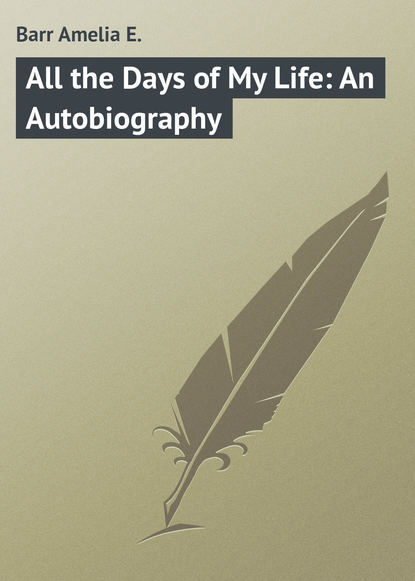По всем вопросам обращайтесь на: info@litportal.ru
(©) 2003-2025.
✖
All the Days of My Life: An Autobiography
Настройки чтения
Размер шрифта
Высота строк
Поля
With kind remembrances and best wishes,
Yours sincerely,
George Merriam.
The Marble Collegiate Church
5th Avenue and 29th Street
November 26, 1901.
My dear Mrs. Barr:
I have been prevented by sickness in my family from getting at “The Lion’s Whelp” until now, and I am in the middle of things. I love a good book, and I love Cromwell, so I am twice blessed in your gift. Everything you do with your pen is well done. I wish all writers were like you.
With thanks and sincere regards,
I am yours,
David J. T. Burrell.
Avalon,
Princeton,
New Jersey.
My dear Mrs. Barr:
Thank you for your very kind and cordial letter, and for the gift of “The Lion’s Whelp”; which I shall read with great pleasure. We have already put something about Cromwell’s Time into the Historic Scenes. I was anxious to get a bit about Dutch New York, and for this reason am particularly glad at the prospect of having a scene from “The Bow of Orange Ribbon.” I read “Jan Vedder’s Wife” over again last summer, and enjoyed it more than ever. It is straight, strong work.
Faithfully yours,
Henry van Dyke.
Oct. 30, 1901.
Cornell University,
Ithaca, New York.
My dear Mrs. Barr:
I greatly enjoyed your lovely letter of about a month ago, and likewise even the winsome book of your story of Shetland; for as to the latter, the pleasure of reading, will have to remain among the joys of the next summer vacation. You see it is term time, and I am usually driven by its tasks as well as by some outside affairs just now.
You are right about our Professor Wheeler; he has a very attractive personality, and the charm of brilliant gifts and attainments. Nor do I wonder at the impression you formed of President White, although it might be modified by better acquaintance. His bodily strength is not exuberant, he holds himself in reserve; he is also a little deaf, and he does not come out so easily as does Wheeler. After so many years, there is a risk in asking about dear ones, but I well remember your two daughters, and should be glad to hear their history.
Sincerely,
M. Coit Tyler.
1, May, 1897.
Mrs. Amelia E. Barr.
Dear Madam:
Pardon this intrusion from one who has just finished reading with intense enjoyment “A Maid of Old New York” and who has been fascinated with its deeper meanings – its words of wisdom, written between the printed lines. On reading to my wife your post word, we both felt that you surely intended us to recognize, as you have, Colonel Theodore Roosevelt as the present name of the courageous and dominating soul, known to the day of which you write, as Peter Stuyvesant. I cannot think we are mistaken in this. We were also keenly interested in a sketch which appeared recently in the Hearst papers, of an autobiography shortly to appear from your pen, giving your beliefs and knowledge as to reincarnation and spiritualistic phenomena. We are very desirous of reading this crowning synopsis of your life’s rich experience and unfoldment, and will be very grateful if we may know when it is off the press and from what publisher to obtain it.
Let me close by thanking you personally and heartily for the pleasure and the profit this book has brought to my wife and myself.
Very sincerely yours,
Charles Stacey Dunning.
The Los Angeles Evening Express,
Los Angeles, California
July 14th, 1912
540 Washington Avenue,
Brooklyn, N.Y.
My dear Mrs. Barr:
Perhaps you do not recall me, as I was but a mite in your busy life, and among so many friends and strangers – Mrs. Terry. I used to call upon you at the Fifth Avenue Hotel, and you perhaps remember my daughter and son-in-law, Colonel Allen, whom you met at Fort Monroe. You surely remember you were made an honorary member of the Officer’s Club at the Fort; the only woman ever so honored. I have just finished reading your latest – “Sheila Vedder,” having long ago read “Jan Vedder’s Wife.”
With much love for you, and your stories,
Your admirer,
Frances A. M. Terry.
June eleventh, 1911.
Devore, California,
June 26th, 1912.
My dear Lady:
Because I must, I am taking this liberty of writing you; and because I am a woman of sixty, I am not stopping to choose words, nor to apologize.
I have been reading of some strange supernatural experiences of yours. I, too, have been favored in that way, also with the gift of prophecy – involuntarily exercised.
The story of the terrific impact of the great hand on the wooden shutter in your home in Galveston, was almost exactly paralleled in my experience.
If your acquaintance with other people has brought you in contact with many who have similar stories to tell, of course you will not be especially interested in mine, but judging from my own life-long investigations, these manifestations are comparatively rare.
Last year before an aviation meet fifty miles away in which a considerable number of entries were made, I announced the name of one who was to fall to his death. I had never seen him, heard no more of him than of any one of the others, but knew he was to die. I even wrote his mother of whom I knew nothing whatever, begging her not to consent to his flight. And at the moment of his fall to death, I fell with him, and told all the particulars to my family, long before the news came over the wire – but I am not trying to convince any one – against his will.
Yours,
Emma J. C. Davis.
notes
1











